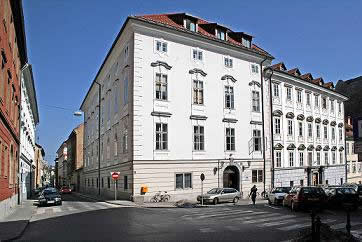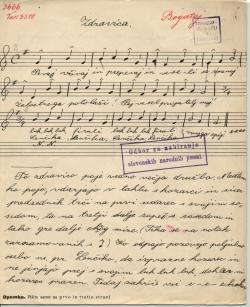
 The Institute of Ethnomusicology (GNI) of the Scientific Research Centre (ZRC) of the Slovenian Academy of Sciences and Arts (SAZU)
The Institute of Ethnomusicology (GNI) of the Scientific Research Centre (ZRC) of the Slovenian Academy of Sciences and Arts (SAZU)
The Institute of Ethnomusicology, the oldest institute of the Scientific Research Centre of the Slovenian Academy of Sciences and Arts, was founded on 21 October 1934. The first director of the institute, which before the Second World War was known as the Folklore Institute, was France Marolt; he steered the work of the institute towards the collection, research and publication of material and the publication of scientific findings. This remains the institute's primary orientation even today.
After the war came organisational, spatial and technical problems and changes. The institute was affiliated to SAZU in 1972 as a section of the Institute of Slovene Ethnology. Since 1994, the year the sound archive was founded, the GNI has been an autonomous institute of the ZRC SAZU comprising the Department of Ethnomusicology, the Department of Textology, the Department of Ethnochoreology and the Sound Archive and Studio. The head of the institute is Prof. Dr. Marjetka Golež Kaučič.
Today the main activities of the GNI, in addition to its regular research work and the publication of results, include the publication of primary and secondary collections of folk songs, the systematic publication of folk dances, the completion, storage and publications on compact disc of its outstanding archive, monitoring contemporary activities relating to music and dance traditions, and professional intervention in those areas where folklorism draws on the heritage of song, music and dance.
The institute`s archives contain over 20,000 folk song manuscripts and more than 50,000 recordings, on wax cylinders, magnetic tapes, audio cassettes, DAT and digital audio files. Closely connected to the archive is the Institute`s studio which protects, systemises, registers and archives audio material. The work at the institute has always been open to the public. In the four decades about 400 radio and television broadcasts have been prepared and numerous audio compact disks, books and other publications have been published.
During the decades of rapid change to our way of life the GNI has monitored the disappearance of folk culture; in an era of globalisation and the alteration or elimination of borders it identifies recognisable forms of Slovene identity in folk songs, instrumental music and dance and looks for points of divergence and convergence in relation to the culture that surrounds us. Its findings allow us to learn more about ourselves and help establish Slovenia within the European and wider international framework.
 The GNI aims to establish the specific aspects of Slovenia's heritage of song, music and dance through comparison with the work of institutions at home and abroad. From very modest beginnings, when all the work was carried out by a single man with almost no equipment, the Institute has grown into an esteemed scientific institution and represents the centre of ethnomusicological activity in Slovenia.
The GNI aims to establish the specific aspects of Slovenia's heritage of song, music and dance through comparison with the work of institutions at home and abroad. From very modest beginnings, when all the work was carried out by a single man with almost no equipment, the Institute has grown into an esteemed scientific institution and represents the centre of ethnomusicological activity in Slovenia.
As a partner in the EU funded project EuropeanaConnect, the institute aims to make available part of its audio collection through Europeana, which is the flagship multi-lingual online collection of millions of digitised items from European museums, libraries, archives and multi-media collections.
- GNI website in English
